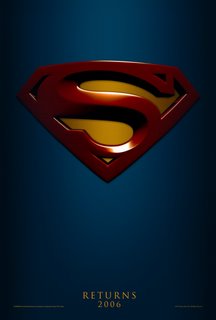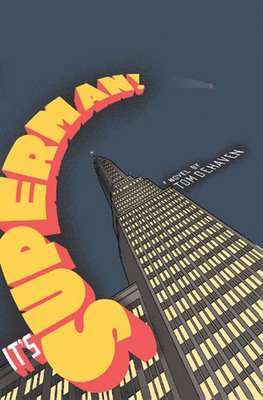Superman had come to town, to see who he could rock

Although still more than six months away, the big release of Summer 2006 promises to be Superman Returns. Director Bryan Singer's take on the comic book, as I understand it, picks up where Superman II left off and ignores the last two of the Christopher Reeve series altogether. Apparently, Singer is going so far as to insert unused footage of Marlon Brando from the Richard Donner films for the role of Jor El, Superman's father.
The gist of the plot is that Clark Kent/Kal El has been mysteriously absent from Earth for several years. In the meantime, both Earth and Lois Lane have moved on and learned to live their lives sans Cape. Of course, so has Lex Luthor, which can't be good news for either Earth or Lois. Supe returns and complications ensue. Singer has been chronicling the whole shoot at his Blue Tights Adventure Network, though I confess I have only allowed myself the occasional sneak peek. I trust Singer's vision (more Max Fleischer than Donner) and fairly enjoyed his X-Men work. I want to be (mostly) suprised come June.
Also in the pipeline is Truth, Justice, and the American Way, starring Ben Affleck as George Reeves, the actor who portrayed Superman in the 1950s television series. That film will focus on the mystery surrounding Reeves's purported suicide in 1959 and his troubled life after the series left him perpetually typecast as the Man of Steel. All in all, 2006 is shaping up to be a Superyear.
 But, you ask yourself, what if I don't want to wait that long to get in on all the cool comic hero action? Glad you asked! Just out is a novel by Tom DeHaven titled It's Superman and it's, well, super man. In prose form - no graphics - DeHaven gives us an alternate version of Clark Kent's coming of age in Smallville, Kansas and eventual move to the big city to fulfill his heroic destiny. Set in the Depression era of 1930's America, It's Superman makes for a great holiday read (or gift to your special Superfan) on several levels.
But, you ask yourself, what if I don't want to wait that long to get in on all the cool comic hero action? Glad you asked! Just out is a novel by Tom DeHaven titled It's Superman and it's, well, super man. In prose form - no graphics - DeHaven gives us an alternate version of Clark Kent's coming of age in Smallville, Kansas and eventual move to the big city to fulfill his heroic destiny. Set in the Depression era of 1930's America, It's Superman makes for a great holiday read (or gift to your special Superfan) on several levels.Foremost, DeHaven's writing and ability to capture the period is outstanding. This is the America of FDR, the WPA, Hoovervilles, the Dust Bowl, strike busters, race riots, and hundreds of other rich details that fill the story and bring that time to life on the page. The characters speak in the language of the Jazz Age: terse, snappy, and with the kinds of exclamations and turns of phrase that have long since passed into linguistic obscurity. Nertz! Rain on that! A fly dick.
DeHaven takes some liberties with the generally accepted Superman myth. First, instead of the fictional Metropolis, the home of the Daily Planet is now real-life New York City. It works. Rather than trying to invent an alternate reality that meshes with all of the other historical details and locations in the rest of the novel, DeHaven simply puts Lois Lane in Columbia University's School of Journalism as she learns the reporter's trade and makes Lex Luthor an Alderman with ambitions for Fiorello LaGuardia's mayorship, and a few other irons in the fire on the side. Again, not strictly by the comic book but seamless nonetheless.
 More substantial are the changes to Clark Kent's adoption and raising by the Kent family. Not only does the couple not know what brought the superbaby to them in the first place, they do not tell Clark anything more than he was adopted until he is nearly twenty years old. Although both parents and son realize there is definitely *something* amazing about the boy and his abilitites, they have no idea just what the cause or root of them are. Consequently, we are presented with a Superman who does not realize he's super yet or even consider to what good purposes his powers could be put. He's frankly scared and feels more like a monster than a hero.
More substantial are the changes to Clark Kent's adoption and raising by the Kent family. Not only does the couple not know what brought the superbaby to them in the first place, they do not tell Clark anything more than he was adopted until he is nearly twenty years old. Although both parents and son realize there is definitely *something* amazing about the boy and his abilitites, they have no idea just what the cause or root of them are. Consequently, we are presented with a Superman who does not realize he's super yet or even consider to what good purposes his powers could be put. He's frankly scared and feels more like a monster than a hero.And at age twenty from a hick town in Kansas, young Clark comes off as just a dullard in a thoroughbred body. When he and a friend of Lois Lane's on the lam from the NYC mob go riding the rails around the West, it feels more like Of Mice and Men, with Clark as Lenny. Wide-eyed and naive, he only begins to realize his true potential when the pair make it back to New York just in time to land smack in the middle of Lex Luthor's first plot for global domination. Fun stuff and an excellent way to avoid annoying family members or relatives if you're holed up at someone else's house during the holidays.
From a screenwriting perspective, especially with comic books and superheroes being the thing du jour, it is recommended to anyone who is thinking of or in the process of conjuring up such a tale (it's why I picked it up myself). The book raises interesting questions about just how a super anyone goes about figuring out that they are, in fact, super. And then, what exactly should they do about it? Think back to your twentieth birthday, what your life and interests consisted of then, and now imagine being charged on that day with saving a city, or a nation, or a world from any and every danger that might befall it. As Clark finds out, it is not as simple a matter of donning a pair of tights and red boots and being Superman. I think most of these films would benefit from a little deeper characterization and a bit more conflict within the hero about their condition, rather than just turning them loose on the bad guys and blowing up a lot of stuff in the process.

0 Comments:
Post a Comment
<< Home